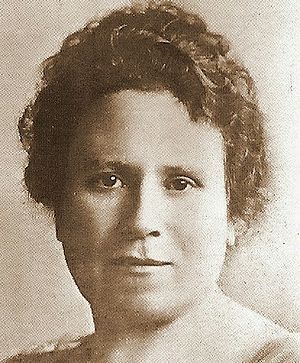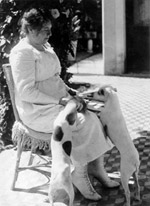Julieta Lanteri facts for kids
Quick facts for kids
Julieta Lanteri
|
|
|---|---|
 |
|
| Born |
Giulia Maddalena Angela Lanteri
March 22, 1873 |
| Died | February 25, 1932 (aged 58) |
| Alma mater | University of Buenos Aires |
| Spouse(s) | Alberto Renshaw |
Julieta Lanteri (born Giulia Maddalena Angela Lanteri, March 22, 1873 — February 25, 1932) was an Italian Argentine doctor, a brave thinker, and a strong supporter of women's rights in Argentina. She also worked hard for many social changes to make life better for everyone.
Contents
Early Life and Education
Julieta Lanteri was born in a small town called Briga Marittima in Italy. When she was six years old, in 1879, her family moved to Argentina. She grew up in the cities of Buenos Aires and La Plata.
In 1891, Julieta made history by becoming the first woman to attend the Colegio Nacional de La Plata, a public high school. She then went on to study at the University of Buenos Aires. In 1898, she earned a degree in Pharmacology, which is the study of medicines.
Julieta then decided to study medicine. This was very unusual for women at the time. Many people, especially those with old-fashioned ideas, did not think women should be doctors. They even said a woman should not examine a dead body. Despite these challenges, Julieta kept going.
In 1904, Julieta and Dr. Cecilia Grierson (who was the first woman doctor in Argentina) started the Asociación de Universitarias Argentinas. This was the first student group for women at a university in Argentina. It helped women support each other in their studies. In 1907, Julieta became only the fifth woman in Argentina to earn a Medical Degree. She was also the first Italian-Argentine woman to become a doctor.
Julieta's Work and Activism
After becoming a doctor, Julieta Lanteri worked for ten years in Buenos Aires hospitals and clinics. She strongly believed that poor people should have better access to medical care. To help with this, she started a medical newspaper called Semana Médica.
Julieta was also very active in fighting for women's rights. In 1905, she started the Argentine Association of Free Thought. She also helped organize the first International Congress of Women in 1910. Later, she helped create the first National Child Welfare Congress, which focused on helping children.
Julieta wanted to teach at the university where she studied, but she was told she couldn't because she was not an Argentine citizen. This made her decide to become a citizen. At that time, it was very hard for single immigrant women to get citizenship in Argentina. So, in 1910, Julieta married Dr. Alberto Renshaw. He was 14 years younger than her, which was also seen as unusual. After an eight-month legal battle, she finally became an Argentine citizen in 1911.
Fighting for Women's Right to Vote
Julieta Lanteri was very smart about the law. She found a law that listed many requirements for voting but didn't say women couldn't vote. So, on July 16, 1911, she convinced an election official to let her vote in a local election in Buenos Aires. This made her the first woman to vote in South America! Women in Argentina didn't get the right to vote nationwide until 1947.
After this, the voting law was changed to say that only people who had done military service could vote. This meant women were again excluded. But Julieta didn't give up. In 1918, she and her lawyer, Angelica Barreda, started a political party called the National Feminist Union. Julieta ran for a seat in the Argentine Chamber of Deputies (like a parliament) in every election until 1930.
Her party wanted many important changes, including:
- Everyone being able to vote, including women.
- Equal rights for men and women under the law.
- Better working conditions and equal pay for women.
- Retirement benefits and maternity leave for mothers.
- Training for women to get good jobs.
- The right to divorce.
- Better care for young people who got into trouble.
- Improvements in prisons.
- No death penalty.
- More money for public health and kindergartens.
- Safer workplaces in factories.
- Rules against making and selling alcohol.
- Preventive medicine to stop diseases.
Even though she didn't win a seat, Julieta received a good number of votes in each election.
Later Life and Legacy
Dr. Lanteri continued to practice medicine, helping women and children who needed mental health care. She also started the first primary school in the town of Sáenz Peña, Buenos Aires. She traveled and gave many talks in Europe.
In 1929, Julieta tried another clever way to fight for women's voting rights. She applied for military service! Her idea was that if military service was required for all citizens to vote, then women should be allowed to serve in the military and therefore vote. Her case even went to the highest court, the Supreme Court of Argentina, but it was turned down.
Death and Remembering Julieta
On February 23, 1932, Julieta Lanteri was walking in downtown Buenos Aires when a car hit her. The driver left the scene. After two days in the hospital, Julieta passed away at the age of 58. More than 1,000 people came to her funeral.
At the time, a newspaper called El Mundo raised questions about the incident. They reported that the police report had the driver's name and car details blotted out. The newspaper writer's home was searched by the police after these details were published.
Julieta Lanteri is remembered as a brave pioneer who fought tirelessly for women's rights and social justice in Argentina. Today, a street in Buenos Aires is named in her honor. In 2019, a new subway station in Buenos Aires was also named after her.
See also
 In Spanish: Julieta Lanteri para niños
In Spanish: Julieta Lanteri para niños
 | Dorothy Vaughan |
 | Charles Henry Turner |
 | Hildrus Poindexter |
 | Henry Cecil McBay |


